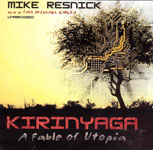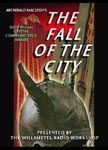
 Kirinyaga: A Fable of Utopia
Kirinyaga: A Fable of Utopia
By Mike Resnick; Read by Paul Michael Garcia
8 CDs or 1 MP3 CD – 10 hours – [UNABRIDGED]
Publisher: Blackstone Audio
Published: 2006
ISBN: 9780786167906 (CD), 9780786174218 (MP3-CD)
Themes: / Science Fiction / Utopia / Dystopia / Terraforming / Sociology / Kikuyu / Storytelling /
“The Kikuyu turned their backs on their traditions once; the result is a mechanized, impoverished, overcrowded country that is no longer populated by Kikuyu, or Maasai, or Luo, or Wakamba, but by a new, artificial tribe known only as Kenyans. We here on Kirinyaga are true Kikuyu, and we will not make that mistake again. If the rains are late, a ram must be sacrificed. If a man’s veracity is questioned, he must undergo the ordeal of the githani trial. If an infant is born with a thahu upon it, it must be put to death.”
Originally published as ten short stories in magazines and collections during the 1980s and 1990s, the novelized Kirinyaga: A Fable of Utopia is one of the definitive examinations of the concept of utopia. These are stories about storytelling, intertwining resentment, mimesis, comparative morality, and the purpose of human existence.
The desire for a better life can lead people to covet an idealized lifestyle, either one of imagination or of tradition. In the 1970s a back to the land movement led a segment of the North American population to go rural, a place most of them had never been before. Most returned home, the conditions were too harsh for those used to the cushy modern society they were brought up in. The promise for a better life via idealistic visions has also created relatively enduring people’s republics the world over. But no people have more incentive to strive for utopia more than those who had their’s stolen from them. The indigenous peoples of the world lament the demolition of their pre-colonization folkways. What if the devastation that resulted from contact between colonizers and indigenous people could somehow be undone? Would those peoples be satisfied to return to the lives of their ancestors as they were prior to contact? Mike Resnick has answers, the most obvious of which is that utopia is not a destination, not a fixed set of cultural behaviors or even the complete happiness of a people. But I may be saying too much. Let it be said then that the pull of “European” technologies and products is so compelling it is hard to imagine forgoing them – more, the meme that things can be different is itself enough to cause change. Enter Kiringyaga: A Fable Of Utopia which relentlessly and unflinchingly examines the struggle for a perfect society.
Though the specific folkways Resnick has chosen to follow in the Kirinyaga stories is that of the Kikuyu of East Africa, these exploratory fictions are equally applicable to Haisla, Bakhtiari, Basque or Maori. The lessons taught by the Koriba, the mundumugu (witch-doctor) are fables. Tales of lion, elephant, hyena. They are fables for the characters being told them, and the novel itself is a parable for us. As the mundumugu it is Korbia’s job to be the repository of the Kikuyu culture. Koriba is a true believer despite, or perhaps because of studying in the European’s finest schools. What he found there among his colonizers is most assuredly not good for the Kikuyu people. What is good for the Kikuyu people is to embrace the wisdom of their traditional lifestyle. His terraformed planetoid, Kirinyaga, may have been manufactured using European technologies but that doesn’t mean Ngai, the god of the Kikuyu, didn’t give it to his people. In recreating the pre-colonial Kikuyu culture Koriba has many disadvantages. Lions and elephants are extinct, so they can’t threaten his people. Maintenance, the engineering and supervisory arm of the Utopian Council, the institution that gave Kirinyaga its charter keeps interfering with the affairs of Kirinyaga. Koriba can’t even kill a newborn baby that was born with a curse upon it (it was born feet first), without Maintenance trying to intervene. Worse, in isolating themselves upon a planet created only for the Kikuyu they now have no enemies for their young men to be vigilant against. What purpose can their lives serve if the segment of their populace that was supposed to guard their people against danger doesn’t have anyone to guard their culture against? They cannot even raid their neighboring peoples for wives because they have no neighbors! And when a young girl with an extraordinary mind wants to learn to read and write, Koriba must prevent her from corrupting the society – no matter the cost. Girls may not be permitted such things – it is not the Kikuyu way. If she were a male she’d be the be the perfect apprentice to the mundumugu, but because she is a girl she has no prospects except tilling her husband’s fields, bearing his children and gossiping with his other wives. As the mundumugu it is Korbia’s job to be the repository of the Kikuyu culture. He is good at his job, but he is only one man, and despite his mighty magic it remains to be seen what one man, however powerful, can do to hold back the idea of progress.
There are a lot of questions that could have been answered in these stories, how were the utopian worlds constructed? Are they full sized planets or terraformed asteroids? Why would you need to adjust an orbit to induce rain or cause a drought? What other utopias exist? Where are they? Heck, where is Kirinyaga in relation to Earth? Ultimately none of these questions are answered. And that absence distinguishes this as Social Science Fiction as opposed to Hard SF. That said, I’m am convinced Resnick has said something with this series that will endure. The seeming contradictions inherent in the disconnect between our moral attitudes and that of Koriba’s are not easily forgotten. Koriba is a man who will use his computer to cause the rains to fall and then actually sacrifice a goat for the same purpose, and in so doing go out of his way to do something that we enlightened folk know will have no real world effect. Is the wisdom he imparts less valid because its source is not falsifiable? Is the magic he wields less real because it is caused by technology, unlike the mundumugus of East Africa? The training of his replacement, a young boy who was the quickest to understand the significance of Koriba’s parables, is fouled because the boy just can’t get past this fact that Koriba ignores facts in favour of cultural truth. Am I crazy for being sympathetic to Koriba’s definition despite my knowledge that he is in some sense a fraud? I really don’t know. The thing that stuck with me the most, the truest thing I came away with was the idea that convenience is a subtle kind of a trap. You can’t have a car without fuel. You can’t have fuel without fueling stations. You can’t have fueling stations without cracking stations. Without drilling rigs and tools to repair them the cracking stations would be pointless. Without the factories to manufacture the machines to make the rigs to fill the stations to supply the fueling stations to fill the cars you can’t have cars. The question then becomes, is the trap worth the cost? Of that, I am not at all sure.
I am saddened that Blackstone has had to omit the Author’s Afterword in which Resnick explains some of the sources of his ideas. Looking at it though, I can see how it would have been difficult to render to audio very compellingly. It is largely composed of original publication notations for the individual stories and lists of awards that each story was nominated for and won. An insert card, were that possible, might have done the trick. Thankfully as is typical with their growing library of Science Fiction audiobooks – the narration here is absolutely top notch. Paul Garcia’s voicing is magnificent, encapsulating and charismatic. His Koriba is a basso rumble that embodies wisdom and surety of a man who knows much. His young men and women are youthful, lively. No accents are used in the production, but we can clearly distinguish between the cultural mindsets by the intonation and stresses. His Masai hunter doesn’t sound Kikuyu. But perhaps most impressive of all is what Garcia does with the stories within the stories. Koriba’s reciting of fables designed to instruct the children in what it means to be Kikuyu are recursive gems of wisdom. In these recitations Garcia is required to narrate a narration and in so doing he will adeptly remind the listener that it is Koriba who is telling these tales, and not Resnick, and also not the characters of the stories themselves – though they have voices of their own. That same Koriba, whose life’s work is the resurrection and regaining of a people’s dignity independent of those who took it away.
Posted by Jesse Willis





